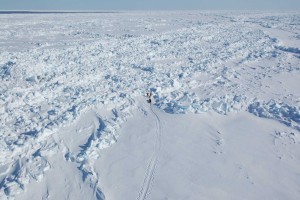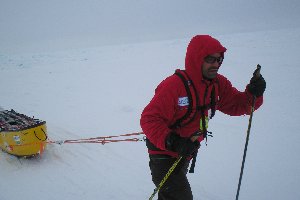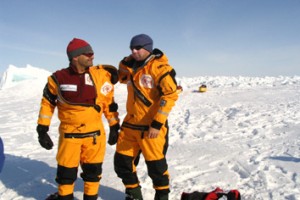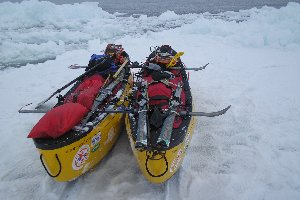May 19, 81 19.19'N:99 10.11'E

Inhospitable - that's the best word we've found to describe the Arctic - at least for us. Polar bears may feel otherwise, but we've already had too many encounters with those.
Today was our best travel day to date. We covered almost 7 miles, much of it in blowing snow. Most times, when we climbed a pressure ridge to scope the route, we couldn't see more than 100 meters. Get the full story in today's audio update.
May 18

As you may know, we are partnered with the University of Maine's Climate Change Institute. The snow samples we collect will be used to measure changes that are occurring in the chemistry of the Arctic atmosphere, as well as climate change. Upon our return, the samples will be analyzed for "major ions," oxygen and hydrogen isotopes, and trace metals. Photo courtesy Rolex/Marc Latzel.
Each night, while Lonnie's cooking and getting the tent ready, I take a few minutes to collect snow. My routine goes like this:
1. Label whirl pack with latitude, longitude & date.
2. Wearing gloves and mask I approach site from downwind.
3. Clean scoop by plunging into snow.
4. Fill whirlpack with snow.
5. Melt snow and pour into 2 pre-cleaned vials.
6. Go back to tent and have a warm drink that Lonnie's prepared.
May 17, 81 10.28'N:98 34.51E

Ice conditions are horrible and there are leads everywhere. We both fell through bad ice today. We also managed to make some northerly progress, about a mile and a half, but will be surprised if it isn't erased by morning. Still, we are getting better at traveling more efficiently. More info in today's audio update.
May 16, 81 11.84'N:98 11.14'E

Given the choice, we'd much rather have a polar bear jump on our tent than get pushed backwards by a strong south- easterly ice drift. Of course, we already had a polar bear jump on the front end of our tent. And for the past four days we have been drifting on a huge counterclockwise gyro of sea ice. So, as you can see, we don't always have a full vote.
Even at the end of seven exhausting hours of travel and our best distance to date (over five miles of distance covered) we still ended up further behind in the evening than where we started in the morning. Add to that another four miles of backwards movement while we slept last night and you can see why we're a bit frustrated. In fact, where we are now is further south than Cape Arctichesky, where we started.
So we've taken the afternoon to formulate a new plan. Instead of traveling due north, we will travel northeast until we reach the 105 longtitude where the ice should start swinging north.
Despite this small setback, we have been traveling really well. From a distance, the ice looks impossibly pressured, yet we always manage to find a safe route through. Each day, we are more and more comfortable in our surroundings and seem to be finding a nice rhythm. We are also healthy with no major sore muscles or joints. In fact, we've even had some really good laughs lately too.
May 15, 81 26.5N;97 85.7E

Many people would answer that question with a resounding "yes." But Dr. Gloria Leon, a psychology professor at the University of Minnesota, wants a little more data before drawing that conclusion. She's studying us as well as our partners left behind.
The focus of the research is the specific stress and coping patterns as we cross the Arctic Ocean, and our decision-making processes and strategies for dealing with the extreme dangers we will encounter. The findings of this investigation should be of interest to NASA as an analog for the types of situations that might occur in two-person teams traversing the Mars surface. The assessment of the reactions of our partners left at home, coping with a dangerous situation over which they have no control, should also be of interest. This investigation is part of an ongoing series of studies by Dr. Leon on various types of national and international polar expedition teams, with findings applied to better planning for and the development of countermeasures to deal with human responses to planetary exploration.
May 14, 81 31.30N:96 76.40E

Check out today's audio entry for Lonnie's account of their first polar bear encounter.
May 13, 81 17.56'N:96 06.20'E

We were about to write how this has been our best progress forward to date...how we covered almost four miles and how our small boats performed nicely in the water. We are in the tent after a long day in a big snowstorm. Instead, we just took out the GPS and found that we've actually drifted further back than where we started yesterday. We had drifted almost a half mile north the night before and with a strong south wind blowing all day, our lack of progress can only be blamed on the fact that it's Friday the 13th.
Besides that bit of bad news we had a great travel day. For a while, we could close our eyes and pretend we were paddling in Minnesota's BWCAW. We spent most of the day paddling on large 'lakes' (up to 1/2 mile wide and much longer). Between the lakes, of course, there were some brutal portages and finding a place to land was oftentimes difficult at best. The sinking feeling we often felt was just that, us sinking through semi-frozen brash ice.
Three ring seals followed our progress for part of the day. They were most curious about us and seemed to think we were a great distraction from finding food and other seal things. We are still relaying canoes when pulling, which makes progress slow, but it would be impossible to do otherwise. We are going to sleep hoping for a change in the drift!
